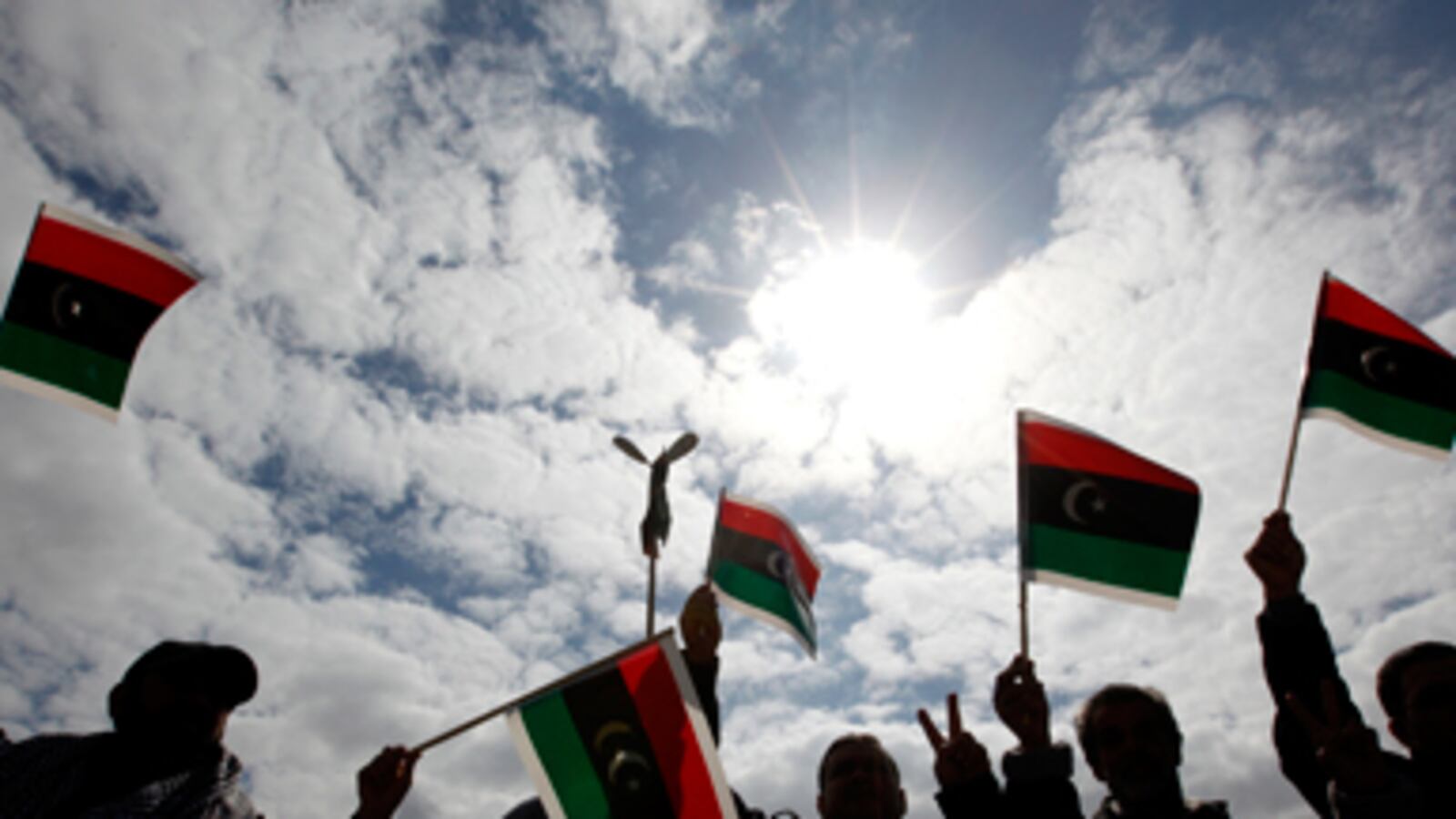With a looming humanitarian disaster in Libya, Western nations are wringing their hands over what to do. Will Europeans take the lead?
So intervention in Libya, if it comes at all, will be up to the Europeans to lead. That’s the implication to draw from Thursday’s meetings in Brussels of NATO defense ministers and EU foreign ministers, and subsequent comments by American officials in Washington. It looks still more likely that any intervention would not be by a united NATO but by what former Defense Secretary Donald Rumsfeld once called “a coalition of the willing,” led in this crisis by Britain and France.
Let’s review the state of play.

The NATO defense ministers broke up with nothing more agreed than stepped-up surveillance of the fighting in Libya; stepped-up monitoring of the U.N. arms embargo on Muammar Gaddafi’s regime; and continued study of other options. “That’s the extent of it as far a no-fly-zone is concerned,” Defense Secretary Robert Gates—who opposes the idea—said afterwards. The ministers are to meet again next week. But Gates and NATO secretary-general Anders Fogh Rasmussen both cautioned that any NATO action would require “a clear legal basis.” (It’s not clear how the NATO warships now off the Libyan coast could enforce—as opposed to merely monitor—the embargo on arms shipments to Gaddafi, since Gates stressed that any use of force would require U.N. Security Council approval.)
On Capitol Hill, meanwhile, the director of national intelligence, James Clapper, was guilty of the unpardonable Washington sin of committing truth.
The foreign ministers of the 27-member European Union contented themselves with calling for tightened economic sanctions against Gaddafi’s regime, perhaps including a freeze on Libya’s oil revenues. German foreign minister Guido Westervelle joined with British foreign secretary William Hague in announcing grandly “our vision is a complete partnership of equals between the peoples of Europe and its neighborhood.” It wasn’t clear what, if anything, this means. In NATO discussions, sources in Brussels say, Germany has opposed military action.
On Capitol Hill, meanwhile, the director of national intelligence, James Clapper, was guilty of the unpardonable Washington sin of committing truth. Clapper—a retired three-star, longtime intelligence professional, and a man respected for his blunt assessments—gave the Senate Armed Services Committee his analysis of the Libyan rebels’ prospects: “I think, frankly, they’re in for a tough row.” Pointing to Gaddafi’s overwhelming advantage in heavy weaponry, he said: “It’s kind of a stalemate back and forth, but I think over the longer term that the regime will prevail.”
Reactions were immediate and predictable. One senator called for Clapper’s resignation; and the White House sprang into damage-control mode. Obama’s national security adviser Thomas Donilon briefed reporters that Clapper’s assessment was “a static and one-sided view.” It might reflect Gaddafi’s lop-sided advantage in weaponry. But, Donilon said, a “dynamic” and “multi-dimensional” view “reflecting…the other forces sweeping the region” would lead to a different conclusion. A ‘senior Administration official’ was quoted as saying: “The President does not think that Gaddafi will prevail.”
On the ground in Libya, however, Gaddafi is prevailing. Increasingly competent assaults by Gaddafi’s forces have driven the rebels from the oil port of Ras Lanuf and from the town of Zawiyah, which eyewitnesses report was reduced to rubble by Gaddafi’s artillery. Gaddafi has ample forces, and the clear determination, to continue this offensive. Donilon’s “other forces sweeping the region” are not in evidence.
Behind all this toing-and-froing is a straightforward sub-plot. The Administration—officials talking on deepest background say—is determined that the Europeans must deploy more than rhetoric and take the lead in any intervention. There is real irritation at calls by British Prime Minister David Cameron for a no-fly-zone which Britain lacks the military capability to enforce. French President Nicolas Sarkozy has gone further and called for air strikes against Libyan bases. Clapper alluded obliquely to these at his Senate hearing: “It’s easy in principle to say do this, do that, and then they turn and say: OK, US you go do it. You use your assets. You use, you know, your men and women. You go out and do it. And then you take the consequences of if something bad happens.” A ‘senior Administration official’ later said: “It’s not enough for them to cheer us on. They have to have some skin in the game. The President has made it clear it can’t be just us.”
The message to Britain and France could not be clearer. As the Administration sees it—this, again, from officials talking on deepest background—Libya is above all a European crisis. “Libya is in Europe’s backyard,” one official said. “Libyan oil is important to the Europeans, arguably vital to Italy. It’s not important to the United States. And if the uprising fails, Europe will have to cope with the exodus of refugees.” The bottom line, as the Administration apparently sees it: “NATO is meant to be a military alliance. If the Europeans can’t muster the forces and the will to tackle Libya, what can they do?”
The aircraft carrier USS Enterprise provides proof of Obama’s thinking. A week ago, the President talked of the US mustering military assets off Libya. But the most powerful US asset, the Enterprise, remains loitering in the Red Sea. It’s been brought back from a planned deployment in the Arabian Sea. But, as of late Thursday, it had made no request to pass north through the Suez Canal into the Mediterranean.
If Britain, France and other European governments do take active steps to deploy forces against Libya, military sources in the Pentagon believe there is little question that President Obama would at least provide assets to support them. (NATO air forces are short of tankers and battle-management aircraft.) Contingency planning is well advanced.
The next steps in this unfolding tragedy will come this weekend. The Arab League is to meet in Cairo on Saturday. There is talk in NATO that a call for action by the League would give some NATO members enough legal support for military action. Baroness Ashton, Europe’s foreign minister, is due in Cairo next day to learn the League’s views. Secretary of State Hillary Clinton is going to Libya’s neighbors, Egypt and Tunisia. If those meetings produce regional support for western intervention, that will change the political dynamic. Even then, though, Obama seems determined that the Europeans will have to take the lead. Rhetoric is not enough.
John Barry joined Newsweek's Washington bureau as national security correspondent in July 1985. He has reported extensively on American intervention in Afghanistan, Kosovo, Haiti, Bosnia, Iraq and Somalia and efforts for peace in the Middle East. In 2002, he co-wrote "The War Crimes of Afghanistan" (8/26/02 cover) which won a National Headliner Award and was a finalist in the ASME National Magazine Awards for public service and a finalist in the SPJ Deadline Club Award for investigative reporting.






